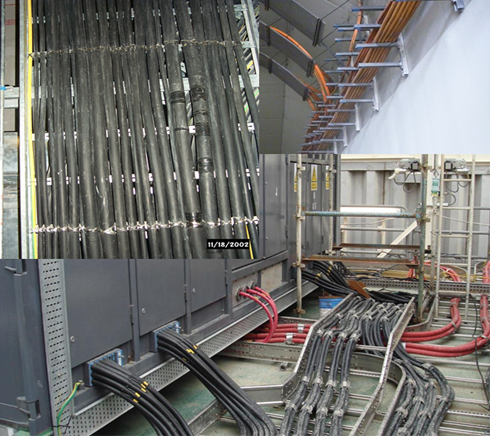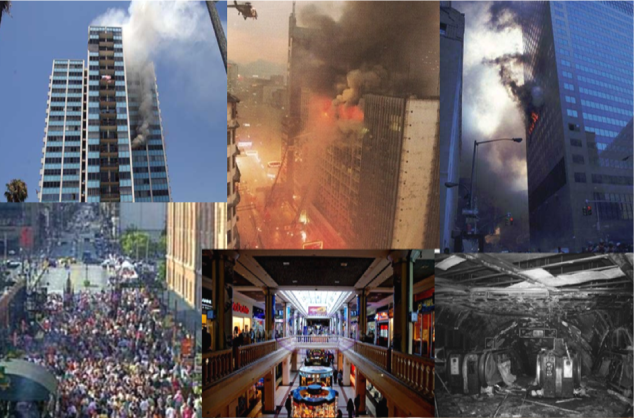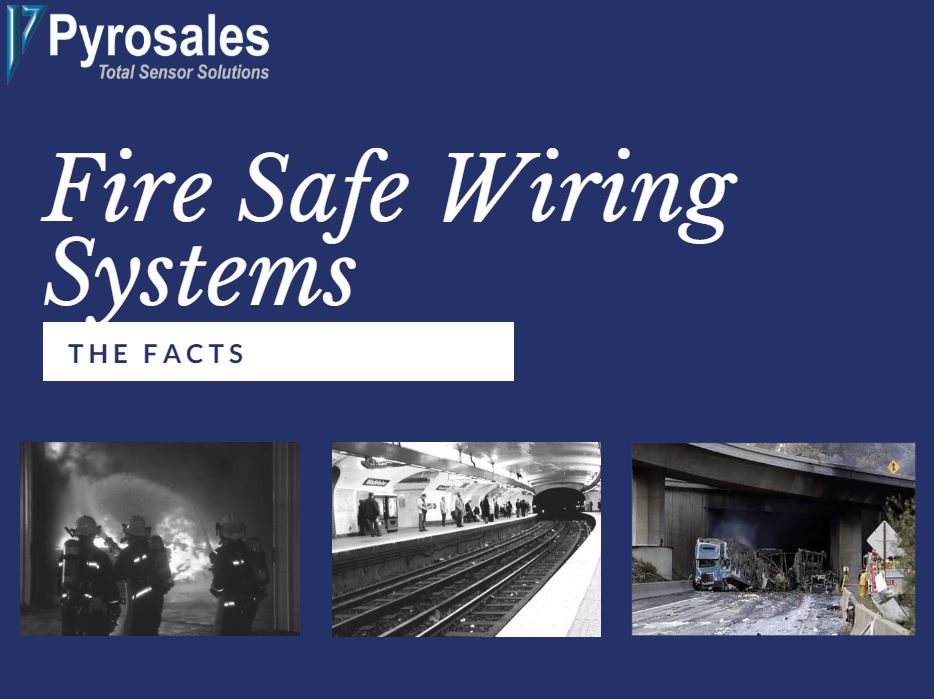1300 737 976
Call us
Live Chat
Call us
What is a MIMS cable?
Also known as Pyro Cable or MICC (Mineral-insulated copper-clad cable).
MICC cables specifically have a copper sheath. Mineral-insulated copper-clad cable is a variety of electrical cable made from copper conductors inside the copper sheath, insulated by inorganic magnesium oxide powder. The name is often abbreviated to MICC or MI cable, and colloquially known as pyro cable. They are commonly used in environments requiring high fire resistance, reliability, and electrical safety, such as fire alarms, emergency lighting, and industrial plants.
When sheathed with metals other than copper, they are called MIMS cables ( mineral insulated metal sheathed cable). MIMS cables are favoured for use in highly corrosive environments, high-temperature applications, or installations requiring a non-copper sheath for compatibility with certain materials or conditions.
Both types maintain the same basic principle of mineral insulation for durability, heat resistance, and electrical reliability.
Pyrosales works with Mineral Insulated Cable Co., Ltd. to supply MICC wiring cable systems. The main function of MICC cable is to ensure during a fire that all the building emergency and essential circuits such as escape lighting, fire sensors, fire alarm circuits, service lifts, water pumps, smoke extractors continue to function both during the building evacuation and the firefighting efforts.

The plastic cables which are halogen-free, most cable makers most often choose polymers like polyethylene (PE & XLPE) because it is easy to process and cheap, however, although polyethylene is halogen-free it has a naturally high fire load and thus likely to propagate flame. Secondly, materials like Polyethylene are commonly used as they are halogen-free. However, burning Polyethylene will produce large amounts of Carbon Monoxide. Carbon monoxide is often claimed to be statistically responsible for most toxicity deaths in fires.
Plastic cable can overload due to short circuits or damage from falling objects bring further large amounts of smoke and toxic gases. As outlined in the NES713 standards, HCL toxicity levels 500ppm can cause fatalities. In addition, HCL corrodes expensive computer networks and equipment. Even low smoke halogen-free (LSHZ) cabling, after a number of fire research institute investigations, show it is not much better than traditional cable.
The mineral insulated fireproof wiring cable which has been developed by experts in MICC is an inorganic materials in the construction of the cable eliminates the production of smoke and poison gas during a fire. It also provides for an extremely mechanically strong cable which can withstand falling objects and water spray. In the environment which is full of heavy acrid smoke MICC fireproof wiring cable increases and enhances the chances that people will escape safely. It is suitable for underground constructions such as road tunnels, vehicle parking and cable tunnels. It is also highly recommended and in some cases covered by local or national standards for installation in train stations, airports, docks, theaters and other high occupancy locations such as public buildings, art galleries and museums.

For some special applications (installations in concert or to the colour scheme of a building) we can serve the outer of the MI cable with an LSF sheath to your colour requirements.
MICC MI cable is a standalone product, the product contains no polymer, uses no zinc, and does not require conduit protection. It is unaffected by the issues associated with cable-in-conduit systems and there have been no changes to the product that has consistently met the requirements for a two-hour fire resistive system when tested to UL2196 and ULC-S139 standards. The test UL2196 is consider by far the most realistic fire cable test in the world and is much more rigorous than any other test. The temperature is higher at 1020 deg C, the test is at full scale and required 5 samples both vertically and horizontal, water spray is with a firemen’s hose.
The temperature rating of MIMS cables (Mineral-Insulated Metal-Sheathed cables) depends on the type of sheath material used, but they are generally designed to operate in extremely high-temperature environments.
The exact temperature rating depends on:
The following is a guide only. Please contact the Pyrosales team for the technical details on each cable.
Continuous Operating Temperature:
Short-Term Exposure:
Special High-Temperature Applications:
With specific sheath materials like stainless steel or nickel alloys, MIMS cables can handle even higher temperatures, sometimes exceeding 1,200°C (2,192°F).
Advantages MICC cable:

Wiring ad Cable and Conduit Combined: The cable sheath provides an excellent earthing medium and core protection, yet the overall diameter is smaller than other types of cables with equivalent current ratings and it is sufficiently pliable to permit intricate routing.
Pliable: MICC MI cable is fully annealed and consequently extremely malleable, enabling it to be easily bent to follow intricate shapes without detriment to its electrical characteristics.
Inherent Flameproof Barrier: MICC MI cable has a solid construction with a non-flammable sheath. The highly compacted insulation will resist the transmission of vapours, gases or flames between items of equipment connected by the cable.
Mechanically Strong:
The cable also withstands considerable abuse such as bending, flattening and twisting, without electrical failure. It is also resistant to rodent attack.
Non-Ageing: MICC MI cable is permanent and will not degrade with age as its sheath, conductors and insulation are for all practical purpose indestructible and completely stable. Hence the cable can be removed and re-used many years after initial installation, with subsequent savings in re-wiring cost.
High Corrosion Resistance: MICC MI cable, with its copper sheath, has a resistance to corrosion and for all normal environments need no additional protection. Where it may be exposed to chemicals specifically corrosive to copper, cables with an LSF protective outer covering are available.
Waterproof: MICC MI Cable has a metal sheath which is impervious to water and gas.
Excellent Earth Continuity: The copper sheath eliminates the need for a separate circuit protective conductor. The excellent low resistance copper sheath conforms to the requirements of the IEE wiring Regulations (BS7671).
Radiation Resistance:
MICC MI Cables are eminently suitable for installation in nuclear radiation environments because of their inorganic construction.
Zero Energy: Bare cable will not contribute to the energy of a fire. A thin LSF outer covering offers minimal fuel to a fire station.
MI With Small Overall Diameter: MICC MI cable have much smaller diameter than other types of cables with equivalent current ratings. This ensures a neat installation with no deep chasing in walls. A thin layer of plaster can accommodate the cable or it can be run inconspicuously on the surface.
High Operating Temperature: Bare cooper sheath MICC MI Cables withstand continuous operating temperature up to 25 degrees Celsius, although the cable can be operated for periods up to temperatures approaching the melting point of copper (1083 degrees Celsius).
Competitive Installed Cost: MICC Cable eliminates the cost and potential structural damage caused by repair and replacement work associated with other cable types. It also prevents the disruption to business operations through the need for building closure to allow such work to take place.
High Degree of Electrical Screening: The solid copper sheath of MICC MI Cables provide an excellent electrostatic screen. In addition, it also maximises electromagnetic compatibility (EMC), enabling the cable to be installed with minimum separation from other cables. For specialised data communication applications, cable with twisted conductors are also available.
Pyrosales also sells the tools and accessories for installation of the Mi cable. Please contact us for any technical datasheets or information
Copyright © 2022 Created by Pepper Digital
Disclaimer – Images for illustrative purposes only and may not be representative of the actual resolution of the camera shown.